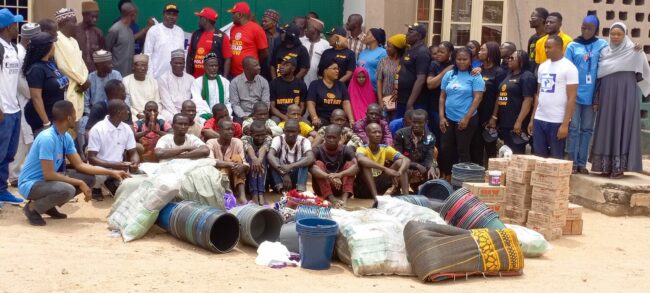On Saturday, the Rotary Club of Bauchi Central led other organisations to visit inmates at Bauchi Correctional Centre, secure release for 21 of them, donate some items, and counsel them.
The other organisations on the visit were Heart That Truly Cares (HTTC), Alwadata Lifeline Initiative (ALLI), and the ASHH Foundation.
The Coalition paid various sums as fines for all 21 inmates who were convicted of various minor offences but could not afford to pay the option of fines given by the courts.
Speaking shortly after the presentation of the items, the President of the Rotary Club of Bauchi Central, Rotarian Pam Dauda, said that the Rotary Club collaborated with the NGOs in order to achieve the set objectives.
He stressed that the more the Rotary Club, as a humanitarian organisation, is interested in the well-being and peace of the people, the more it collaborates with like-minded organisations to better the lives of the people.
Pam Dauda explained that the partnership was able to raise the amount spent for the payment of the fines as well as the purchase of the items donated to the inmates.
Also speaking, the Executive Director of Heart That Truly Cares (HTTC), Josephine Ibinola, said, “As Rotarians, our resolve is to make life better for all manner of people.”
According to her, “We discovered during our visits before today that some of the inmates can become better people outside the walls of the correctional house; we then decided to pay the various fines for 21 of them.”
Josephine Ibinola added that “we spent over N700,000 to settle the fines aside from the other items we brought for them, at least to make life in the correctional centre bearable for them.”
She added that the collaboration was easier because all of them are Rotarians, so it was very easy for them to bond together in the service of humanity, which is the cardinal service of the Rotary Club all over the world.
Winifred Robinson is the Executive Director of Alwadata Lifeline Initiative (ALLI), which was part of the collaboration aimed at bringing succour to the inmates.
She stressed that her NGO contributed disposable sanitary pads for use by the female inmates, considering the condition they found themselves in, which may make it difficult for them to get such pads during their monthly flow.
She stressed that it is part of their fundamental human rights in spite of being in a correctional centre where her movement and liberty have been restricted.
Winifred Robinson added that, as a female, the need for hygiene during the monthly flow cannot be overemphasised, which is why her NGO supported the initiative to visit the centre.
The items donated to the inmates based on the needs assessment conducted included religious books, copies of the Qur’an, Bibles and other devotionals, eating plates, rubber buckets, mats, clothing, packets of Maggi, sanitary pads, and food items.
Some of the freed inmates expressed appreciation to Rotary, HTTC, and ALLI for coming to their aid at the most precious time in their lives, saying that with the intervention, they would have been left to serve out their various sentences.
